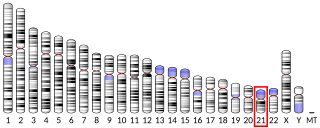
Interferons are a group of signaling proteins made and released by host cells in response to the presence of several viruses. In a typical scenario, a virus-infected cell will release interferons causing nearby cells to heighten their anti-viral defenses.

Signal transducer and activator of transcription 2 is a protein that in humans is encoded by the STAT2 gene. It is a member of the STAT protein family. This protein is critical to the biological response of type I interferons (IFNs). It functions as a transcription factor downstream of type I interferons. STAT2 sequence identity between mouse and human is only 68%.

Interferon-alpha/beta receptor beta chain is a protein that in humans is encoded by the IFNAR2 gene.

Interferon alpha-1 is a protein that in humans is encoded by the IFNA1 gene.

Interferon beta is a protein that in humans is encoded by the IFNB1 gene. The natural and recombinant protein forms have antiviral, antibacterial, and anticancer properties.
Interferon alfa-2b is an antiviral or antineoplastic drug. It is a recombinant form of the protein Interferon alpha-2 that was originally sequenced and produced recombinantly in E. coli in the laboratory of Charles Weissmann at the University of Zurich, in 1980. It was developed at Biogen, and ultimately marketed by Schering-Plough under the trade name Intron-A. It was also produced in 1986 in recombinant human form, in the Center for Genetic Engineering and Biotechnology of Havana, Cuba, under the name Heberon Alfa R.

Interferon alpha-2 is a protein that in humans is encoded by the IFNA2 gene.

Interferon alpha-17 is a protein that in humans is encoded by the IFNA17 gene.

Interferon alpha-4 is a protein that in humans is encoded by the IFNA4 gene.

Interferon alpha-7 is a protein that in humans is encoded by the IFNA7 gene.

Interferon alpha-14 is a protein that in humans is encoded by the IFNA14 gene.

Interferon omega-1 is a protein that in humans is encoded by the IFNW1 gene.

Interferon alpha-8 is a protein that in humans is encoded by the IFNA8 gene.

Interferon alpha-10 is a protein that in humans is encoded by the IFNA10 gene.

Interferon alpha-5 is a protein that in humans is encoded by the IFNA5 gene.

Interferon alpha-21 is a protein that in humans is encoded by the IFNA21 gene.

Interferon-alpha/beta receptor alpha chain is a protein that in humans is encoded by the IFNAR1 gene.

Interferon alpha-6 is a protein that in humans is encoded by the IFNA6 gene.
Interferon alfa (INN) or HuIFN-alpha-Le, trade name Multiferon, is a pharmaceutical drug composed of natural interferon alpha (IFN-α), obtained from the leukocyte fraction of human blood following induction with Sendai virus. Interferon alfa contains several naturally occurring IFN-α subtypes and is purified by affinity chromatography. Although the pharmaceutical product is often simply called "interferon alpha" or "IFN-α" like its endogenous counterpart, the product's International nonproprietary name (INN) is interferon alfa.

Interferon alpha-1/13, also known as IFN-alpha-1/13, is a protein that in humans is encoded by the IFNA1 and IFNA13 genes.






